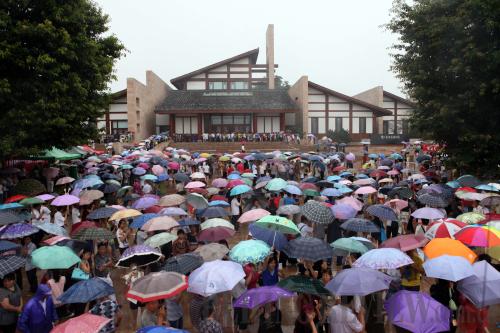|
 |
|
SHOWING RESPECT: Visitors wait in the rain to enter a memorial hall dedicated to late leader Deng Xiaoping on August 22 in Guang'an, Sichuan Province (LIAO XIAOBING) |
A mind for progress
Deng was born on August 22, 1904, in Guang'an, southwest China's Sichuan Province. Drizzling rain this August 22 did not stop people in the city from laying flowers before a bronze statue of Deng at his former residence and bowing in respect.
"We should thank Deng for our current prosperity," Liu Jianxin, a Guang'an resident visiting the statue with his granddaughter, told China News Service. "His reform and opening-up policy solved our food and clothing shortages."
Deng passed away in 1997. He was widely revered for his political courage, innovation and strategic thinking. His commemoration in 2014 is especially significant as it comes in a year in which China's new leadership has announced plans to "comprehensively deepen reform."
At a symposium at the Great Hall of the People in Beijing on August 20, President Xi Jinping described Deng as "the chief architect of China's socialist reform, opening up and modernization." Xi said the current leadership should learn from Deng's political courage, vowing to proceed with reforms and augment the nation's development without hesitation.
Participants in a seminar in Shanghai compared the recent opening of the Shanghai Pilot Free Trade Zone to the establishment of the Pudong New Area in the early 1990s, a vanguard development of which Deng was a major propellant.
"The strategy Deng advocated was reform driven by opening up. Today, the strategy still holds for Shanghai and the whole country alike," said Zhou Hanmin, an expert in international law who was involved in the creation of the Pudong New Area.
An editorial published by the People's Daily on August 22 stressed Deng's emphasis on the rule of law. People must adhere to and have confidence in the country's legal system, it said, quoting the famous Deng line, "construction of the market and legal systems must keep pace with each other for China's new road of reform."
The major campaign marking the 110th anniversary of Deng's birth also includes a re-publication of his works and official biography, while national broadcaster China Central Television screened Deng Xiaoping at History's Crossroads, a 48-episode TV drama series documenting Deng's experiences from 1976-84.
Chief scriptwriter Long Pingping of the Party Literature Research Center of the CPC Central Committee is a senior expert on Deng's theories. He said that he hoped the drama could dismiss some popular misunderstandings about Deng and the reform he led. "After 35 years of rapid development, China has entered a stage when many new social problems start to surface. Some people wrongly attribute this phenomenon to the reforms designed by Deng," said Long.
"The fact is that Deng was among the first leaders to discover problems caused by speedy economic growth. He proposed the transformation of China's economic growth model in the mid-1980s and also started to ask the greater society to protect the environment and conserve energy and resources very early on," said Long.
Deng believed "socialism with Chinese characteristics" would eventually lead to common prosperity. "The country should allow some regions and people to get rich first and then gradually push for common prosperity," he said. Some claim, however, that Deng's policy caused the yawning income gap in China today. "Deng had openly advocated 14 times for allowing some regions and people to get rich first, but he always emphasized that it was the necessary path to achieving common prosperity," said Long.
Professor Xie Chuntao, with the Party School of the CPC Central Committee, told Xinhua News Agency, "When Deng is mentioned, reforms and opening up are the first things that come to mind. As the country faces tough tasks that necessitate deepened reforms, we need to keep his legacy in mind now more than ever."
Reform has been at the top of China's political agenda since the current leadership took office in late 2012. An important CPC Central Committee meeting held in November 2013 unveiled a detailed roadmap for these revisions.
President Xi personally heads the Central Leading Group for Overall Reform. At its four meetings so far, a dozen plans have been launched covering areas that range from the workings of the fiscal, educational and judicial systems to the widening of household registration opportunities and control of state-owned enterprises.
Email us at: lili@bjreview.com | 